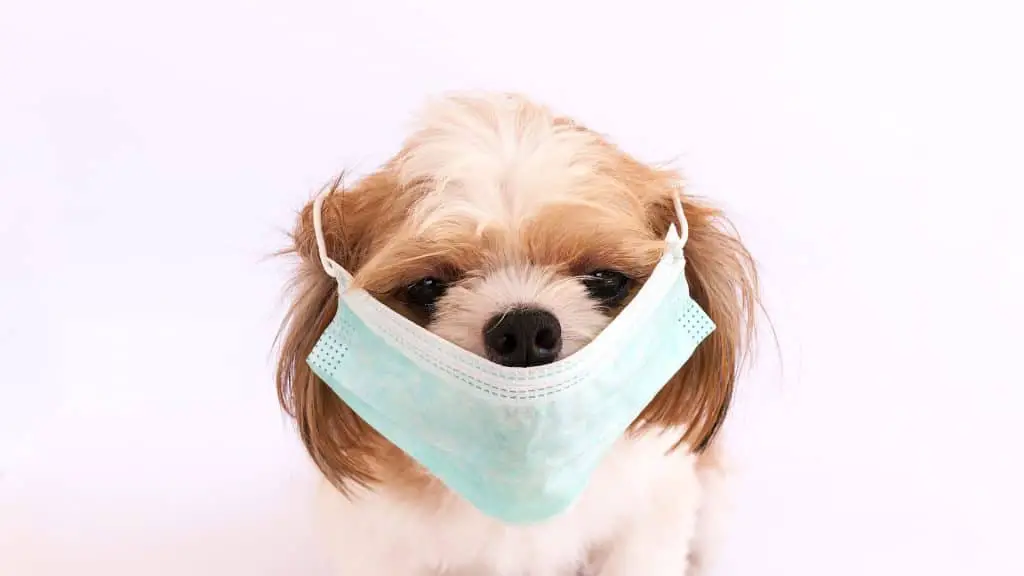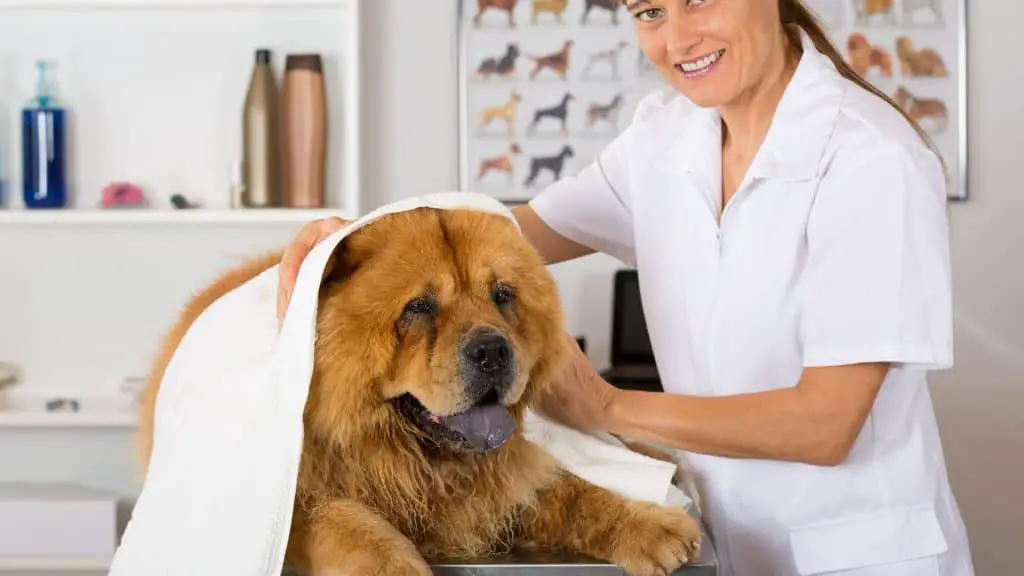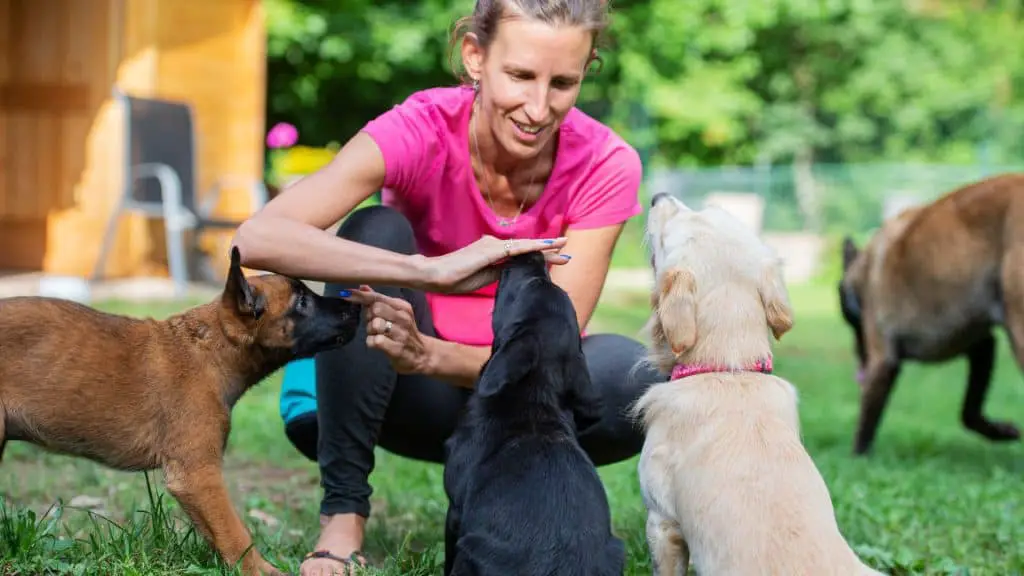Table of Contents
How Can a Puppy Get Parvo?
Did you know that a puppy can get Parvo?
Puppies are especially susceptible to the virus and can easily catch it from other dogs. Parvo is a deadly virus that can cause serious health problems in puppies.
Getting your puppy vaccinated against this virus is essential and keeping them away from other sick dogs.
There are many ways to protect your puppy from getting Parvo. Vaccination is the best way to prevent your puppy from becoming ill.
You should also keep your puppy away from other sick dogs and ensure they eat a healthy dog diet.
Get your puppy vaccinations today and protect them from this deadly virus!
Tell Me the Origin of Parvo – Canine Parvovirus

Parvo or “Canine Parvovirus” is a canine virus that is highly contagious and commonly affects puppies. The virus is present in the feces of infected dogs and can infect other dogs through direct or indirect contact.
Parvo is most commonly spread through adult dog parks, where infected dogs can leave the virus on the ground for other dogs to pick up.
Handle infected dogs with extreme caution, and always wash your hands thoroughly after contact.
The virus can also be spread indirectly through contaminated food bowls, toys, or other objects.
The virus can also be spread indirectly, such as when an infected dog contaminated his owner’s clothing and the owner then touched another dog.
Although adult dogs can contract the virus, they are more likely to recover from it than puppies.
Puppies are more vulnerable to the virus because their immune systems are not yet fully developed.
For this reason, it is essential to vaccinate puppies against Parvo and to avoid taking them to places where they might be exposed to the virus.
Tell Me the Meaning of Parvo

Parvo is a virus that primarily affects dogs but can also infect other animals.
The most common symptom of Parvo is vomiting, which can lead to dehydration and death if left untreated.
The virus is spread through contact with infected feces, so keeping your dog away from areas where other adult dogs have defecated is essential.
Parvo is most commonly seen in puppies whose immune systems are not yet fully developed.
However, an adult dog can also be infected, especially if they have not been vaccinated against the virus.
Aggressive treatment for Parvo typically involves hospitalization and intensive supportive care.
Some dogs require blood transfusions and intravenous fluids, while others may need surgery to correct intestinal damage.
Dogs have a stomach and small intestines lined with villi, which are tiny finger-like projections that help absorb nutrients.
Parvo damages the villi, preventing the dog from being able to absorb food and leading to severe dehydration.
In some cases, the virus can also cause myocarditis and heart muscle inflammation.
This can lead to arrhythmias and sudden death.
With prompt and proper treatment, the majority of dogs affected by Parvo will make a full recovery.
What Is Canine Parvovirus?

Canine parvovirus, or “parvo,” is a highly contagious virus that affects dogs of all ages, but puppies are most susceptible.
The virus attacks the lymphocytes, a type of white blood cell that helps fight infection, and can cause severe vomiting and diarrhea.
A white blood cell count decrease can leave the body susceptible to infection.
Canine parvovirus can also lead to anemia, dehydration, and death.
There are two types of canine parvovirus: type 1 and type 2.
Type 1 is the more common and less severe form of the virus, while type 2 is more powerful and can be fatal.
Most dogs who contract the virus will recover, but puppies are at a higher risk for severe illness and death.
Canine parvovirus infection is a highly contagious disease that affects dogs. It is caused by a virus and can lead to serious health problems, including death.
The canine parvovirus vaccine is highly effective in preventing Parvo the virus.
How Is Parvo “Canine parvovirus” Spread?
Parvo is spread through direct or indirect contact with the feces of infected dogs.
The virus can also be spread through contaminated food, water, or objects.
Puppies are most commonly infected with Parvo through dog parks, where they can come into contact with the feces of the infected dogs.
Symptoms of Parvo in Puppies
Parvo is a severe, very contagious virus that can be deadly for puppies. However, many pet owners are unaware of the signs and symptoms of this disease.
The parvo symptoms include vomiting, diarrhea, and dehydration. If your dog shows any of these symptoms, it’s essential to get them to a veterinarian immediately.
Early detection is crucial for getting treatment started quickly, so it’s important to know what to look for.
One of the most common symptoms of Parvo is severe diarrhea.
This can be accompanied by vomiting, lethargy, and a loss of appetite.
Another telltale sign is fever, which is often one of the first symptoms to appear.
Bone marrow is responsible for creating new red blood cells, which parvovirus can affect. Symptoms of Parvo in puppies include lethargy, pale gums, and anemia.
If your puppy shows any of these signs, it’s essential to take them to the vet immediately.
With prompt treatment, most puppies will make a full recovery. However, without treatment, Parvo can be fatal.
Signs that Your Dog May Have Parvovirus
Parvovirus is a highly contagious disease that can be deadly for dogs, especially young puppies.
Early detection is key to treatment and recovery, so it’s essential to be aware of the signs and symptoms of parvovirus.
One of the most common signs of parvovirus is bloody diarrhea. This can sometimes be accompanied by vomiting, lethargy, and loss of appetite.
Other signs include fever, dehydration, and abdominal pain. In severe cases, young puppies may also experience seizures or sudden death.
If you suspect your dog may have parvovirus, it’s essential to seek a veterinarian immediately.
While there is no cure for the virus, early treatment can help to shorten the duration of symptoms and improve the chances of recovery.
How Can I Prevent My Dog from Getting Parvo or “Canine Parvovirus”?
You love your pet, and the last thing you want is for them to get sick.
Unfortunately, many things can make your furry friend ill – including parvovirus, more commonly known as “parvo.
Many young puppies congregate with Parvo, a deadly virus.
Parvo is a severe virus that can be deadly for dogs, and it’s essential to know how to prevent it.
Puppies parvo is a deadly virus that can affect them at any age.
A dog’s parvovirus vaccination is essential for puppies younger than 16 weeks old, as they are more susceptible to the virus.
The good news is that you can take some simple steps to keep your pup safe.
First, make sure your dog is up-to-date on their vaccinations. This is the best way to prevent Parvo, as the vaccine will help your dog build up the dog’s immune system to the virus.
Secondly, keep your dog away from places where other dogs have been – especially if you don’t know if those dogs are vaccinated.
This means avoiding dog parks, doggy daycare, and even specific neighborhoods where unvaccinated strays might roam.
Finally, If you think your dog has been exposed to Parvo – or if they start showing symptoms like vomiting or diarrhea – take them to the veterinarian immediately.
The sooner you catch it, the better the chances are for a full recovery.
Your dog can be a safe haven from the virus with proper cleaning and veterinary care.
How Long Does Parvo Last?
Nobody likes getting sick, and that goes double for our furry friends.
Canine Parvovirus, more commonly known as “parvo,” is a severe illness that can be deadly for dogs, particularly puppies.
But how long does Parvo last?
Unfortunately, there is no easy answer to that question.
The length of time a dog is infectious depends on the strain of the virus and the individual dog’s immune system.
In general, however, most dogs will start to show symptoms within 3-10 days of exposure.
The virus can then remain in the environment for up to six months, so it’s essential to keep your pup away from any potential sources of infection.
The good news is that vaccines are available to help protect your dog from Parvo.
If you’re concerned about your pup getting sick, talk to your veterinarian about starting them on a vaccination schedule.
How Does a Dog Get Parvo?
Parvo is a nasty virus that can affect dogs of all ages, but young puppies are especially vulnerable.
The virus is spread through contact with contaminated feces and can quickly become fatal if left untreated.
Symptoms of Parvo include vomiting, diarrhea, and lethargy, so it’s essential to be vigilant if you suspect your dog may be sick.
Early diagnosis is key to giving your furry friend the best chance at recovery, so don’t hesitate to contact your veterinarian if you have any concerns.
Parvo Treatment
Parvo is a virus that affects dogs, causing severe vomiting and diarrhea. If left untreated, it can be fatal.
The good news is that there are treatments available that can help to save your dog’s life.
The first step is to take your pet to the vet as soon as you suspect they may have Parvo.
They will likely be hospitalized and put on IV fluids to prevent dehydration.
They may also be given antibiotics to help prevent secondary infections. In some cases, they may require blood transfusions.
Recovery from Parvo can take weeks or even months, but with treatment, most dogs make a full recovery.
Treatment for Parvo typically involves aggressive hydration therapy to combat dehydration. In severe cases, dogs may also need antibiotics to fight a secondary bacterial infection.
So if your furry friend is showing signs of Parvo, don’t hesitate to get them the treatment they need.
What Are Breeds of Dogs Susceptible to Parvo?
There’s nothing cuter than a new puppy. But before you bring your furry friend home, it’s essential to be aware of the risks.
One of the most dangerous viruses for puppies is Parvo. Parvo is an extremely contagious disease that can be deadly, especially for young dogs.
Breeds particularly susceptible to Parvo include Rottweilers, Doberman Pinschers, Labrador Retrievers, and Pit Bulls.
The virus is typically spread through the mother’s milk, so it’s essential to ensure your puppy has been vaccinated.
Parvo is also extremely contagious, so it’s essential to take precautions if you’re around any dog that may be infected.
How to Deal with Unvaccinated Dogs Having Parvo?

If you’re a dog owner, the chances are you’ve vaccinated your furry friend against all the necessary diseases – including parvovirus, more commonly known as “parvo.”
But what happens if you come into contact with unvaccinated dogs who have Parvo?
While it’s always best to avoid contact with any sick animals, there are a few things you can do to protect your pet.
First, ensure that your dog gets plenty of mother’s milk. This is important because a mother’s milk contains antibodies that can help combat the virus.
Make sure your pet is up-to-date on all their fully vaccinated. If you’re not sure, talk to your veterinarian.
Additionally, keep your pet away from other dogs that may be infected with Parvo. The virus is extremely contagious and can quickly spread from one dog to another. If you must be around an unvaccinated dog with Parvo, try to avoid direct contact – no petting or playing.
Finally, if your pet does become infected with Parvo, it is crucial to seek veterinary care immediately.
Treatment involves intravenous fluids to combat dehydration and antibiotics to prevent secondary bacterial infections.
Don’t forget to wash your hands thoroughly after contacting the sick animal.
With prompt treatment, most dogs will recover from Parvo. However, untreated dogs often succumb to the disease within days.
FAQs
How Likely Is a Puppy to Get Parvo?
The virus is spread through dog shows, boarding kennels, and close contact with other dogs.
Parvo is highly contagious and can be deadly, so it’s essential to be aware of the clinical signs. Symptoms of Parvo include vomiting, diarrhea, lethargy, and loss of appetite.
There is no cure for Parvo, but early diagnosis and treatment can help improve the chances of survival.
Treatment typically includes hospitalization, intravenous fluids, and antibiotics.
Puppies are most at risk for Parvo, so if you’re considering getting a puppy, be sure to ask the breeder about their vaccination schedule and whether they require all puppies to be quarantined until they’re fully vaccinated.
Taking these precautions can help reduce the risk of your puppy catching Parvo.
How Many Doses Need for Parvo?
Puppies can get Parvo by contracting the virus, often through feces. It is a highly contagious disease and can be fatal. Puppies need to receive multiple doses of the vaccine to help protect them against the virus.
How Can a Puppy Get Parvo?
A puppy can get Parvo by contacting an infected animal or eating their feces or infected feces.
Can My Puppy Get Parvo from My Backyard?
Your backyard is not a place where your puppy can get Parvo.
How Can I Prevent My Dog from Getting Parvo?
Parvo is a highly contagious virus that can affect dogs of all ages but is most dangerous to puppies and unvaccinated dogs.
There is no cure for Parvo, but treatments available can help improve the chances of survival for affected dogs.
Prevention is vital, so ensure your dog is vaccinated against Parvo and keep them away from other sick animals.




Leave a Reply
You must be logged in to post a comment.